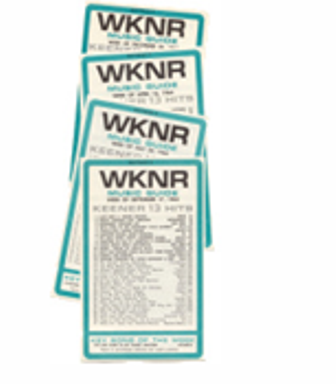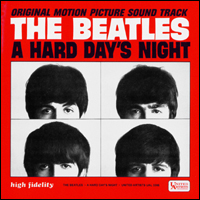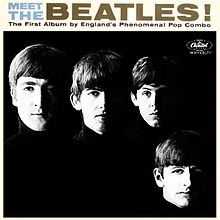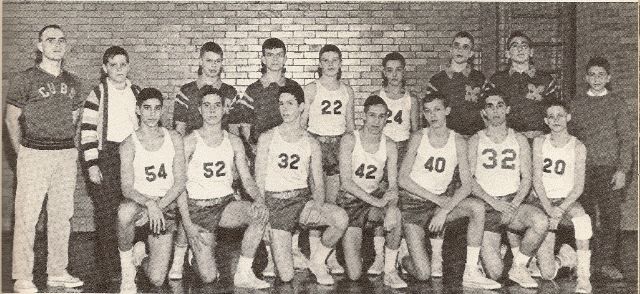Kind of a Big Deal
Kind of a Big Deal
A Hard Day’s Night, by the Beatles (1964), encountered 1964
Not A Second Time, by the Beatles (1963), encountered 1964?
I believe I can remember the first time I heard about the Beatles, sometime during late winter 1964 (my freshman year), in the boys’ locker-room of my high school, after a junior varsity basketball practice.[1] I think someone was saying he was expecting to watch them on Ed Sullivan, which means we were probably two of three days before either Sunday, February 9 or Sunday, February 16, the dates of the Beatles’ first two appearances on the show.[2] I took it in, but didn’t make any personal plans to watch. (There was no TV in my house until June of that year anyhow .) I understood the Beatles were kind of a big deal, but this was a month or so before my ears started opening up, as described in the previous Theme Song piece.
Had I even heard their music at this point? I think I must have, as I was already attending high school dances at least sporadically. Surely by early 1964, they were already playing the Beatles at the dances. (I Want to Hold Your Hand had charted on January 18 and She Loves You the following week.) But evidently I just wasn’t listening yet. I’m quite certain that when my classmate spoke up about Ed Sullivan, I could not have called a single Beatles melody to mind.
No, my path to satori was a by-product of my growing interest in girls. It was no secret that the youngsters doing most of the screaming at Beatles concerts were female. If you wanted to have something to talk about with girls, knowing something about the Beatles might come in handy.
There was one Beatles fan in particular, call her Becky, whose mom and my parents met at the beginning of that summer of ‘64. Her mom was part of my parents’ academic crowd, and I think everybody thought Becky and I were suitable companions. Well, all the grownups did.
Actually, I’d give a lot now to know what Becky herself thought about the whole thing. Her mom had the reputation of being a scalp-hunter, out to sleep with academic stars and to flirt with smaller fry. I can’t speak about whom the mom really slept with (or didn’t); it could all have been unfounded gossip. But the flirtatiousness I had myself observed, aimed at my stepdad. In fact a little bit of it was extended in my direction (and a little bit was powerful stuff).
I know Becky had observed this too. Would you want to go out with a callow boy who had been deliberately buzzed by your mom? I’m asking the question, not answering. All I’m certain of is that it was complicated.
She may have felt as confused as I did, given the pretty obvious enchantment her mom exerted over me. Sometimes Becky treated me like a confidant, and at others as if I were an annoyance. Because our families quickly became intimates, I was constantly visiting with her throughout the summer and fall of 1964. She certainly held me at arm’s length, with off-putting remarks like: “Kisses shouldn’t be handed out; like jewels, they’re valuable because they’re rare.” On the one hand, this kind of comment kept me from trying to kiss her, and in retrospect I’m sure that was an intended effect.[3] On the other hand, it spurred me to try finding shared topics to fascinate her with.
Which is where Beatlemania came in. The on-ramp for me was the Beatles’ movie A Hard Day’s Night. The soundtrack album came out in June,[4] soon followed by the movie itself. When I was visiting with my father in New York that August, I persuaded him to take me to see it, largely to have something to talk about with Becky. But not exclusively for that reason. By now I was listening to the right radio stations back home: CKLW and WKNR, which certainly featured Beatles music prominently.[5] And the stores in Times Square all seemed to be playing the songs. And so I must have heard it all on the radio before ever seeing the movie (seven songs from the movie/album having charted by that point in the summer).
When I heard just that first George Harrison chord (possibly G eleventh suspended fourth),[6] I knew I was in for an adventure. No great distinction for me to perceive that, of course: everyone in my generation had that same moment of epiphany. What followed that chord in the movie, though (the madcap chases, the lower-class Liverpudlian attitudes, the sneering toffs, and the hard-rocking love songs with the soft-core centers, the camaraderie of the four lads) was an initiation into a brand-new and exciting world and made me fall even harder. There was something, too, about the fourths and fifths the Beatles liked to harmonize with – different from the thirds my ear had been trained up till then to anticipate, that forever came to be associated in my mind with the bracing strangeness of the life on the screen in that movie.
Remember, I was from England, sort of. So I felt as if this should have been part of my birthright. But my dim memories of the place held nothing that looked or sounded anything at all like this. Like most impressionable youngsters of that day, I wanted to go to England, to be English, and part of that scene.
I bought a copy of the album for Becky as a birthday present – which, by good luck, was the only Fab Four album she didn’t already have.[7] But of course, to a teenager in 1964, Beatlemania was like a Roach Motel: you could check in, but you couldn’t check out. Of course I had to have the record myself. I bought my own copy three days after handing over the first one to Becky. And then I went and saw the movie again with my Ann Arbor friends six days after that.
I got to know the songs. I played my harmonica alone in my room along with them. I bought a songbook and played the songs on the piano (to the best of my limited ability and the dismay of my parents downstairs). I became happily obsessed.
There was a lot more to the music than a chord, I was learning. Not that I was exactly thinking; I was just responding: to the straight-ahead rock ’n’ roll of the early Beatles. It drew me in with the just the right mix of challenge and coziness.
And I began to develop a dollop of sophistication. Top 40 Radio bringing me this incredible mix of excitement (#1 hits from that year – apart from those of the Beatles, who had five of them – included vintage stuff from Peter and Gordon, Roy Orbison, the Beach Boys, the 4 Seasons, the Animals, the Supremes, and the Shangri-Las). There were dances on Friday nights at the high school where you could hear these things cranked way up (and I got a young woman neighbor to show me how to dance properly). And I spent hours in the record store, looking at the posters and the album covers, and taking in what they were playing on the PA system.
Somewhere in that fall, I remember being at a dance, and actually telling a girl “This music is the sound of our generation.” Why would I say something so obvious? Well, partly because it wasn’t quite so obvious then. We had scotched the snake of the Mitch Miller sound, not killed it. (It’s worthy of note that Dean Martin also had a #1 hit that year.) And we also hadn’t converted our parents, to most of whom it was and remained nothing but noise. (It was surely just noise to my mom and stepdad, though, blessedly, my father seemed to be hearing something.) But that remark was also a statement of allegiance. I was refusing to follow my parents’ likes and dislikes any more.
In later years, my mom spoke of having “lost” me. She was, of course, talking about a lot more than my music. But in a real sense it started with the music. Implicit in her thinking was that she had laid down a course for the two of us to walk together, and then I’d inexplicably wandered off it. My perspective was the opposite: I’d gone on a voyage of discovery that her own tastes had done a great deal to send me out on, and then she’d refused to accompany me where the path naturally led. And, as I’d said before, the Beatles (especially of this era) were actually a pretty cozy lot. Our moms should have loved them. But for some reason they couldn’t hear.
Of course I went on and bought all of the Beatles’ records, mostly in mono. I still have them, sacred relics. Shortly after I secured the soundtrack LP of A Hard Day’s Night, I bought their first Capitol album, Meet The Beatles. More actually than A Hard Day’s Night, that album – the whole album – was the theme song of my late 1964. But if I have to choose just one number from the album, I’m going to take Not A Second Time as my theme song.
You can argue about whether it’s the hardest-rocking song on the LP; in my opinion it is, because of George Martin’s pounding piano, and because of the awfully jazzy minor keys (G minor and E minor) alternating among which John Lennon (sole writer and singer) carries on proceedings. Allegedly the melody comes down on an “Aeolian cadence,” something Lennon had never heard of.[8] No more had I, nor do I understand the technical lingo to this day. I just know that it was the song that ended the album, a powerful finish that amounted to a calling card.
And I, as it happens, was accepting visitors.
What then of Becky, who had precipitated these discoveries? Things there never got unweird. We did share a few occasions that could reasonably be labeled dates, but she resisted any efforts to get physically or emotionally close. And then came a climactic moment of weirdness. Two different strands of my life suddenly got snarled on each other, and I was left not knowing whom to believe. Becky told me that “Patricia,” of whom I wrote concerning another song, was spreading word that I in turn had been spreading trashy calumnies about Becky. Apart from the shock of being accused of things I would never have done, the notion of these two having any contact was surprising (they attended different schools in different grades). To this day, I have no idea whether Patricia actually said these things, or whether Becky was making up the story that Patricia had said these things, or whether some intermediary had started the rumor. Deny it though I might, Becky’s way of dealing with it was not to go out with me anymore. She deigned to come to a party of mine, and we did see each other through our parents a while longer. Eventually Becky’s mom left town and never had any contact with her former circle again, nor did I ever hear anything further of Becky. And so there the story truly ended.
And as for me, I did not mourn long. Like Milton’s shepherd, I composed myself and made for “fresh Woods, and Pastures new.” There were lots of girls out there.
So that was that. But I had a fine legacy from the relationship, an introduction to the sound of my generation – someone I knew called it that.
[1] This is not a subtle way to sneak in a brag about my athletic prowess. I had none. I went out for the team because I knew how bad I was, but had just entered a stage of my life where I thought that maybe by lowering my horns and charging I could remedy the problem. I couldn’t. If you can interpret the team photo (me second from right in back row), you can determine this. (Clue: the jacketed ones didn’t actually get to play much.)
[2] Though there are an infinitude of Beatles books, my constant vade mecum in Fab Four matters is the late Ian MacDonald’s Revolution in the Head (3d ed. 2005), which is the finest book on the Beatles I’ve ever encountered. At the moment I’m consulting the appendix containing a Chronology at page 416.
[3] Another effect, almost certainly intended, was to differentiate Becky in her own mind from her mom. The mom not only kissed me on occasion but allowed me to kiss back – and I could see Becky’s discomfiture while it was happening. I can only plead extreme youth and cluelessness for letting myself get swept up in a potential girlfriend’s mom’s psychodrama like that.
[4] So we’re clear, I’m talking about the 1964 red-covered U.S. soundtrack album including some instrumental tracks, not the British blue-covered album with 13 songs, which is now issued as the standard version in the States as well. They are well distinguished in this Wikipedia entry.
[5] WKNR was particularly important, because they had these weekly lists of the hot records that you could pick up at the record store, all done up in the instantly-recognizable WKNR turquoise, vital because they gave a neophyte like me a fighting chance to understand everything gushing out of the spigot of music I had just turned on. Here’s a  photo of the guides. And here’s a good website about the station, source of the photo.
photo of the guides. And here’s a good website about the station, source of the photo.
[6] So saith MacDonald at 115. Whatever G eleventh suspended fourth even means. I don’t know what that monster chord really was. A few years after I first heard the song, I acquired some sheet music and tried to play the chord the transcriptionists had put in its place. Of course, I was on the piano, not the guitar. But it wasn’t too hard to figure (while trying and failing to make my right hand stretch all the way to the top) that this was a substitute. It was a good sound, an intriguing sound, but not that initial slab of arch wonderfulness. Apparently not everybody agrees with MacDonald anyway. Check out this amazing article by Chris Hook for further dissection of the chord. Hook collects 14 different names various experts have given the chord and mentions seven others. Hook’s take is that you can’t duplicate this sound without a 12-string guitar, deploying eight of the strings – and then you need John replicating it on a 6-string, Paul hitting a high D on the base, and then you still need a post-production snare tap by Ringo and piano chord by George Martin on a Steinway buried in the mix. No wonder my feeble piano effort seemed so short of the mark.
[7] Though, as will be seen, nothing wonderful came of the relationship, I think at that moment it was as good as it ever got, because that gift was clearly for Becky, and had nothing to do with her mom, and maybe it made clear to her that I wasn’t just hanging around Becky to get access to her mom, or vice versa.
[8] MacDonald at 97-98.
Copyright (c) Jack L. B. Gohn


